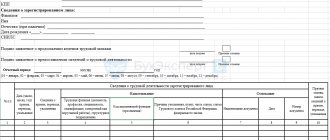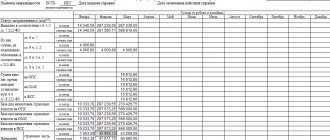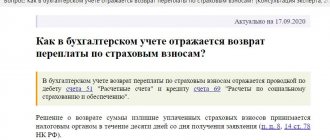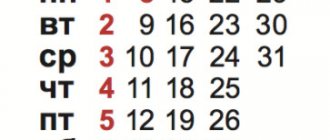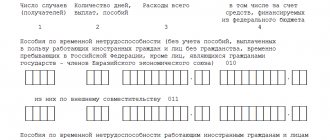How is downtime due to the employer's fault paid?
To calculate insurance premiums, it is very important to correctly classify demurrage payments. What is this - compensation or part of the salary? According to the author, payment for downtime is part of remuneration because:
- the downtime period is working time (letter No. 22-2-2004);
- payments for downtime directly depend on the amount of wages of employees (parts 1-3 of article 157 of the Labor Code of the Russian Federation);
- payment for downtime is provided for in Chapter 21 “Wages” of Section VI of the Labor Code (regulatory Federal Antimonopoly Service No. F09-5435/05-S2 dated December 6, 2005);
- all types of compensation that the employer is obliged to pay to the employee are specified in Section VII “Guarantees and Compensations” of the Labor Code;
- payment for downtime is not compensation, since it is not intended to reimburse the employee for any expenses incurred in the performance of work duties (Art.
Therefore, the calculation formula will look like this: 30,000 rubles (monthly salary) x 2/3 (calculation rate) / 21 working days (in June 2021) x 11 working days of downtime = 10,476.19 rubles. About how to view the funded part of the SNILS pension using this link https://otdelkadrov.online/11509-kak-proverit-pensionnye-nakopleniya-po-snils-onlain-cherez-drugie-istochniki Correct registration of the fact of downtime and correct calculation of payments for forced cessation of work can significantly reduce the financial costs of the employer, because payment for officially registered downtime is almost a third less than the wages accrued to employees during a normal work schedule. Deduction of tax from payment Payment for downtime must be reflected in income tax as a set of non-operating expenses.
Ivanov for forced downtime due to the fault of the employer will be: 1491.94 rubles x 11 working days of downtime x 2/3 = 10940.89 rubles. It is also necessary to take into account the peculiarities of including downtime time in the length of service when applying for labor pensions. Here, the entire time of a citizen’s official work is taken into account, which includes the total downtime. When applying for an early retirement pension, calculating the length of service does not imply the inclusion of a period of downtime, regardless of its reason.
An example of calculating downtime in the absence of the culprit of the incident: let’s take the initial data of the previous example about gr. Ivanova. The absence of the culprit of downtime involves the payment of 2/3 of the salary without additional charges. The procedure for paying for downtime depends on whose fault it occurred: • The employer - at least 2/3 of the employee’s average earnings is paid (part 1 of Article 157 of the Labor Code of the Russian Federation); • The employee - not paid (part 3 of Article 157 of the Labor Code of the Russian Federation); • Neither the employee nor the employer - at least 2/3 of the employee’s tariff rate or salary, calculated in proportion to downtime (Part 2 of Article 157 of the Labor Code of the Russian Federation), is paid. If the downtime was due to the fault of the employer, it is paid in the amount of 2/3 of the employee’s average earnings. Average earnings must be determined in accordance with: • Art. 139 of the Labor Code; • with the Regulations on the specifics of the procedure for calculating average wages, approved by Decree of the Government of the Russian Federation N 922 (hereinafter referred to as the Regulations on Average Earnings). If the downtime lasted several working days, payment for downtime is determined by multiplying the average daily earnings by the number of days of downtime and by 2/3 (p. Information about downtime is taken from the sheets of actual working time.
- Set the start of the downtime to January 15, 2021, and the end to January 16, 2021.
- When delivering raw materials to the enterprise warehouse, announce in a separate order the end of the downtime and the return to work of the main workers of workshop No. 5.
- Familiarize all interested parties with the contents of this order.
- I reserve control over the execution of this order.
- Basis document: Act No. 1 “On downtime” dated January 15, 2018, recorded by senior engineer V.A. Morozov. in the presence of the deputy production manager of Rostvertol LLC Sivtseva E.I., chief economist Polishchuk N.O.
In this case, the legal punishment would be to hold the employee financially liable. Production downtime can directly affect one employee, a group of employees, a specific department, or an entire enterprise. It can be caused by various reasons and may be to blame:
- company employee (theft of equipment or raw materials, violation of labor discipline or safety regulations);
- employer (business conversion, all types of crisis, violation of the employer’s contract with its counterparties, lack of demand for products);
- other circumstances that do not depend on either one or the other (man-made disasters, natural disasters).
If the downtime was caused by a breakdown or malfunction of equipment, the employee is obliged to notify the employer about this.
Setting up the accrual type
To calculate payment for downtime due to the fault of the employer, a new type of accrual must be created in 1C 8.3. 1. Section Salaries and personnel – Salary settings – Salary calculation – Accruals.
2.
Create
.
3. In the Name
, fill in the name of the accrual type – Payment for downtime due to the fault of the employer.
4. In the Code
, enter the accrual type code (it must be unique).
5. In the Personal Income Tax
, set the switch to
the Taxable
Income Code
field , select code 2000 “Remuneration for the performance of labor or other duties, salary and other taxable payments to military personnel and equivalent employees.”
6. The Income category
is filled in automatically with the value Salary.
7. the Income in kind
if the accrual is not paid to employees in person.
8. In the Insurance premiums
, select the method of accounting for employee income when calculating insurance premiums.
In our example, select Income that is entirely subject to insurance contributions (Clause 1, Article 420 of the Tax Code of the Russian Federation). 9. In the Income Tax
, type of expense under Art.
255 of the Tax Code of the Russian Federation, set the switch to the position taken into account in labor costs under the item and select clause 6, Article 255 of the Tax Code of the Russian Federation. 10. In the Reflection in accounting section, in the
Reflection method field, specify the method for reflecting the accrual in accounting to generate accrual transactions.
Select the value from the Salary Accounting Methods directory (section Salaries and Personnel – Salary Settings – section Reflection in Accounting – Salary Accounting Methods). If the corresponding method of reflection is not available in the directory, it must be created. In this reference book, only a debit account is specified (account for accounting expenses for wages). This field should be filled in only if the accrual is reflected in accounting in the same way for all employees of the organization. In this case, when accruing, the reflection method that is specified for the employee in his card is used (section Salaries and Personnel - Employees - Expense Accounting), or (if not specified) the reflection method that is specified for the organization as a whole (Salaries and Personnel - Salary Settings – Procedure for accounting for wages – Reflection in wage accounting) 11. The checkbox Included in the basic accruals for calculating the “Regional coefficient” and “Northern bonus” accruals
must be cleared, because
the average earnings when calculating downtime due to the employer’s fault are initially calculated taking into account the regional coefficient and the northern allowance. 12. Button Record and close.
About personal income tax and insurance premiums when paying employees for forced downtime
About personal income tax and insurance premiums when paying employees for forced downtime
MINISTRY OF FINANCE OF THE RUSSIAN FEDERATION
LETTER
dated August 25, 2021 N 03-04-05/74451
The Tax Policy Department reviewed the LLC’s appeal dated June 10, 2020 and, regarding questions about taxation, reports the following.
In accordance with paragraph three of Article 72.2 of the Labor Code of the Russian Federation (hereinafter referred to as the Labor Code), downtime is a temporary suspension of work for reasons of an economic, technological, technical or organizational nature.
According to paragraph two of Article 157 of the Labor Code, downtime for reasons beyond the control of the employer and employee is paid in the amount of at least two-thirds of the tariff rate, salary (official salary), calculated in proportion to the downtime.
The procedure for taxing the income of individuals with personal income tax is provided for in Chapter 23 “Income Tax for Individuals” of the Tax Code of the Russian Federation (hereinafter referred to as the Code).
In accordance with paragraph 1 of Article 207 of the Code, taxpayers of the personal income tax are individuals who are tax residents of the Russian Federation, as well as individuals who receive income from sources in the Russian Federation who are not tax residents of the Russian Federation.
According to paragraph 1 of Article 210 of the Code, when determining the tax base for personal income tax, all income of the taxpayer received by him both in cash and in kind, or the right to dispose of which he has acquired, as well as income in the form of material benefits, are taken into account. determined in accordance with Article 212 of the Code.
In accordance with paragraph 1 of Article 226 of the Code, Russian organizations from which or as a result of relations with which the taxpayer received income subject to taxation are required to calculate, withhold from the taxpayer and pay the amount of personal income tax calculated in accordance with Article 224 of the Code, with taking into account the features provided for in Article 226 of the Code.
These persons are referred to in Chapter 23 “Income Tax on Individuals” of the Code as tax agents.
According to paragraph 4 of Article 226 of the Code, tax agents are required to withhold the accrued amount of tax directly from the taxpayer’s income upon actual payment.
Based on the provisions of subparagraph 1 of paragraph 1 of Article 420 and paragraph 1 of Article 421 of the Code, the object and basis for calculating insurance premiums for insurance premium payers are organizations that make payments and other rewards to individuals subject to compulsory social insurance in accordance with federal laws on specific types of compulsory social insurance, payments and other remuneration are recognized, accrued, in particular, within the framework of labor relations, with the exception of amounts not subject to insurance contributions specified in Article 422 of the Code.
Based on the provisions of paragraph 10, subparagraph 2, paragraph 1 of Article 422 of the Code, all types of compensation payments established by the legislation of the Russian Federation, legislative acts of the constituent entities of the Russian Federation, decisions of representative bodies of local self-government are not subject to insurance premiums (within the limits established in accordance with the legislation of the Russian Federation) related, in particular, to the performance of work duties by an individual.
The concept of compensation related to the performance of labor duties by an individual, as well as cases of their provision, are defined by the Labor Code.
In accordance with Article 164 of the Labor Code, compensations are monetary payments established to reimburse employees for costs associated with the performance of their labor or other duties provided for by the Labor Code and other federal laws.
Payments to employees made during downtime through no fault of the employer or employees cannot be recognized as compensation payments, since they are not aimed at reimbursing employees’ expenses related to the performance of their job duties.
At the same time, Article 422 of the Code does not provide for a special rule on including in the list of amounts not subject to insurance contributions, which is exhaustive, payments to employees made during the downtime period.
Thus, payment by an organization for forced downtime on the basis of the provisions of subparagraph 1 of paragraph 1 of Article 420 of the Code is subject to insurance contributions in the generally established manner as a payment within the framework of labor relations.
At the same time, we inform you that the Federal Law of June 8, 2020 N 172-FZ “On Amendments to Part Two of the Tax Code of the Russian Federation” for those included in accordance with the Federal Law of July 24, 2007 N 209-FZ “On the Development of Small and Medium Enterprises in the Russian Federation” Federation" on the basis of tax reporting for 2021 to the unified register of SMEs, organizations operating in sectors of the Russian economy that were most affected by the worsening situation as a result of the spread of the new coronavirus infection, the list of which was approved by Decree of the Government of the Russian Federation dated 04/03/2020 N 434, provides for the establishment of an insurance premium rate of 0 percent in relation to payments and other remunerations in favor of individuals accrued for April, May, June 2021.
